Impact of Disruptive Technologies on Hyatt Regency Hotel Services
VerifiedAdded on 2021/02/22
|11
|2963
|189
Report
AI Summary
This report analyzes the impact of disruptive technologies on the hospitality industry, using Hyatt Regency as a case study. It explores technologies such as augmented reality (AR), artificial intelligence (AI) and robotics, and near-field communication (NFC). The report provides an overview of disruptive technologies, their background, and purpose, discussing how they can revolutionize hotel operations. The findings and discussion section details the advantages and disadvantages of each technology, including AR's ability to enhance guest experiences, AI and robotics for improved efficiency and service delivery, and NFC for streamlined processes like room keys and payments. The report concludes that these technologies offer significant opportunities for Hyatt Regency to improve its services, enhance customer experience, and optimize operations, while acknowledging the associated costs and challenges. The report is designed to provide insights to the Hyatt Regency management on the implications of disruptive technologies in the hospitality sector.
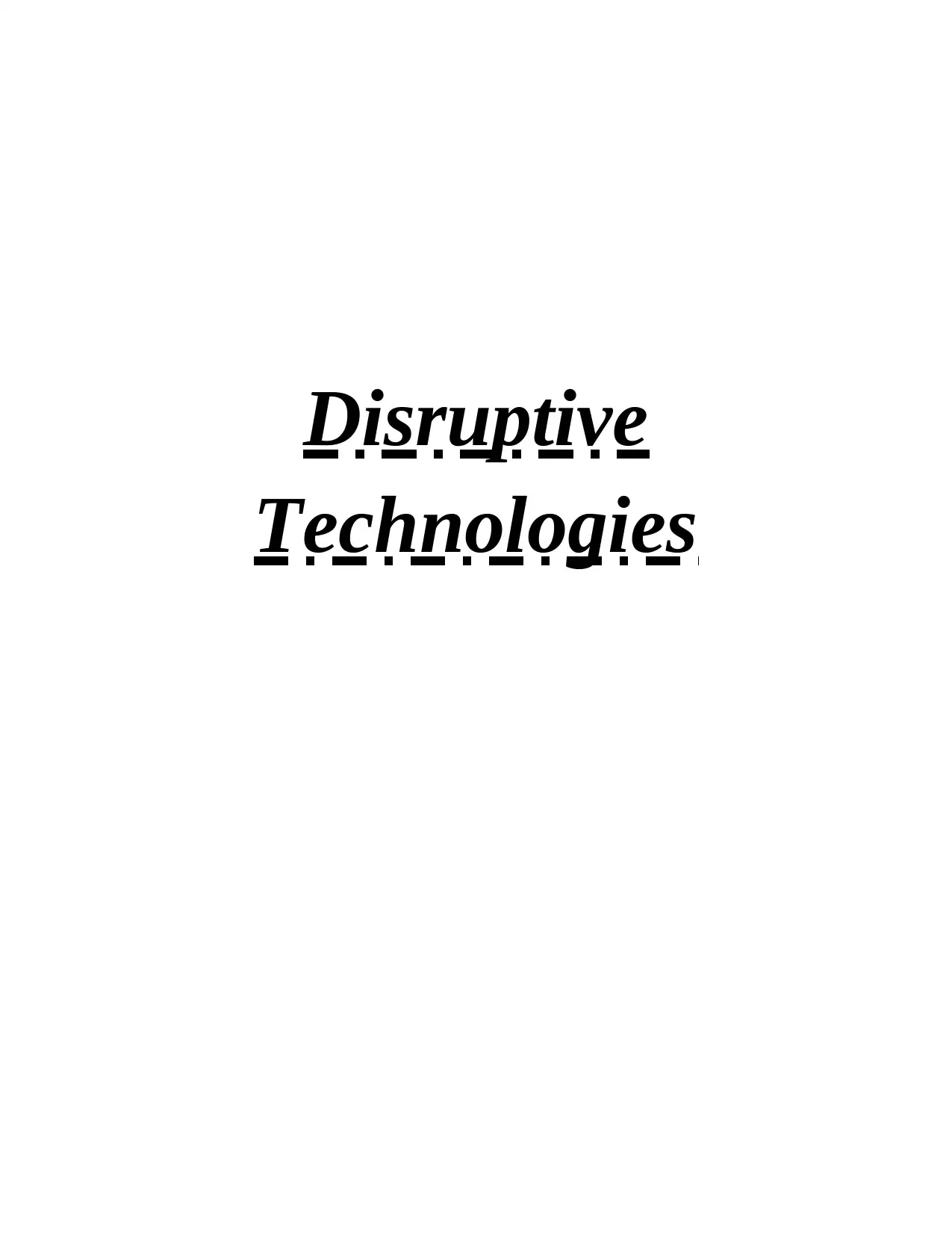
Disruptive
Technologies
Technologies
Paraphrase This Document
Need a fresh take? Get an instant paraphrase of this document with our AI Paraphraser
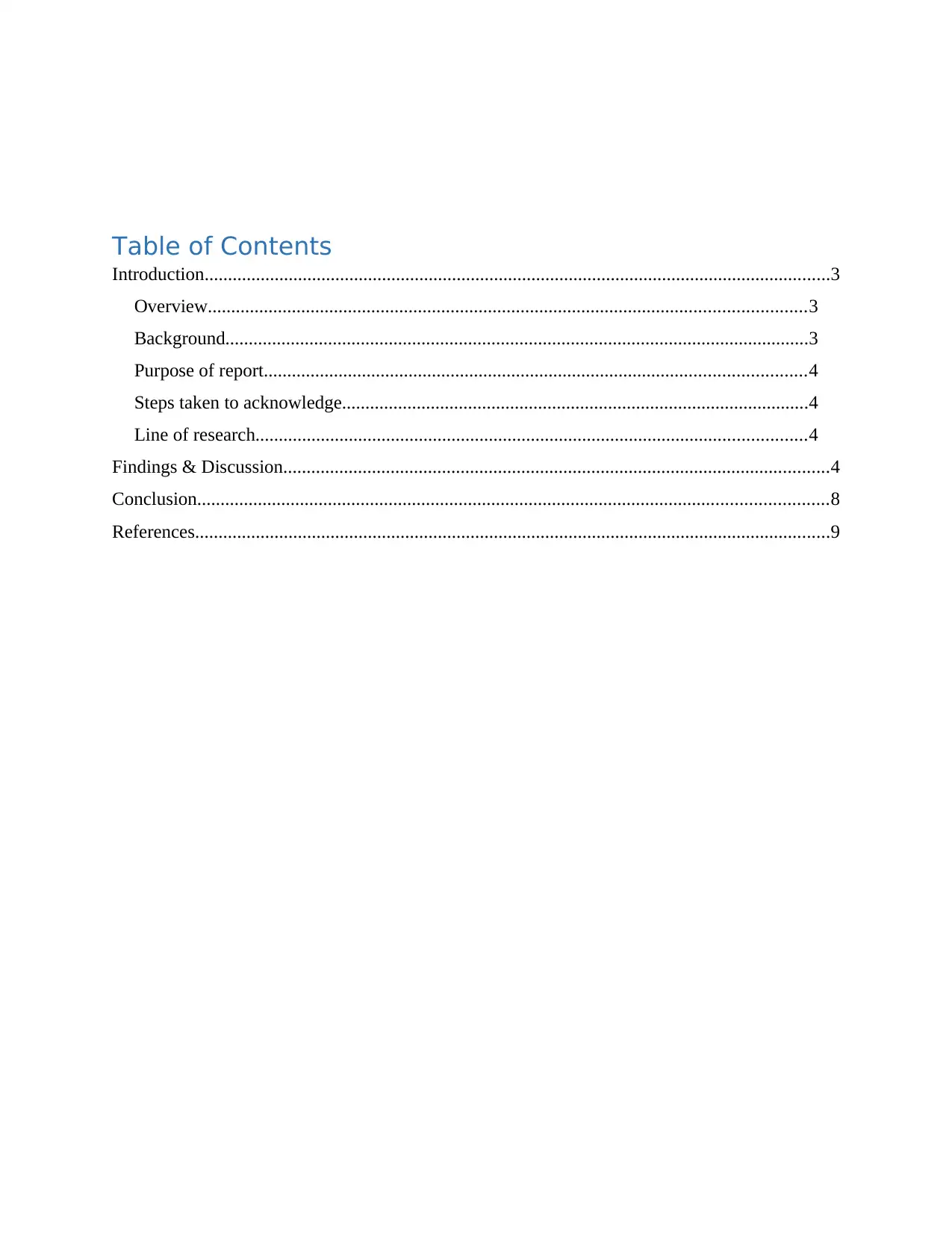
Table of Contents
Introduction......................................................................................................................................3
Overview................................................................................................................................3
Background.............................................................................................................................3
Purpose of report....................................................................................................................4
Steps taken to acknowledge....................................................................................................4
Line of research......................................................................................................................4
Findings & Discussion.....................................................................................................................4
Conclusion.......................................................................................................................................8
References........................................................................................................................................9
Introduction......................................................................................................................................3
Overview................................................................................................................................3
Background.............................................................................................................................3
Purpose of report....................................................................................................................4
Steps taken to acknowledge....................................................................................................4
Line of research......................................................................................................................4
Findings & Discussion.....................................................................................................................4
Conclusion.......................................................................................................................................8
References........................................................................................................................................9

⊘ This is a preview!⊘
Do you want full access?
Subscribe today to unlock all pages.

Trusted by 1+ million students worldwide
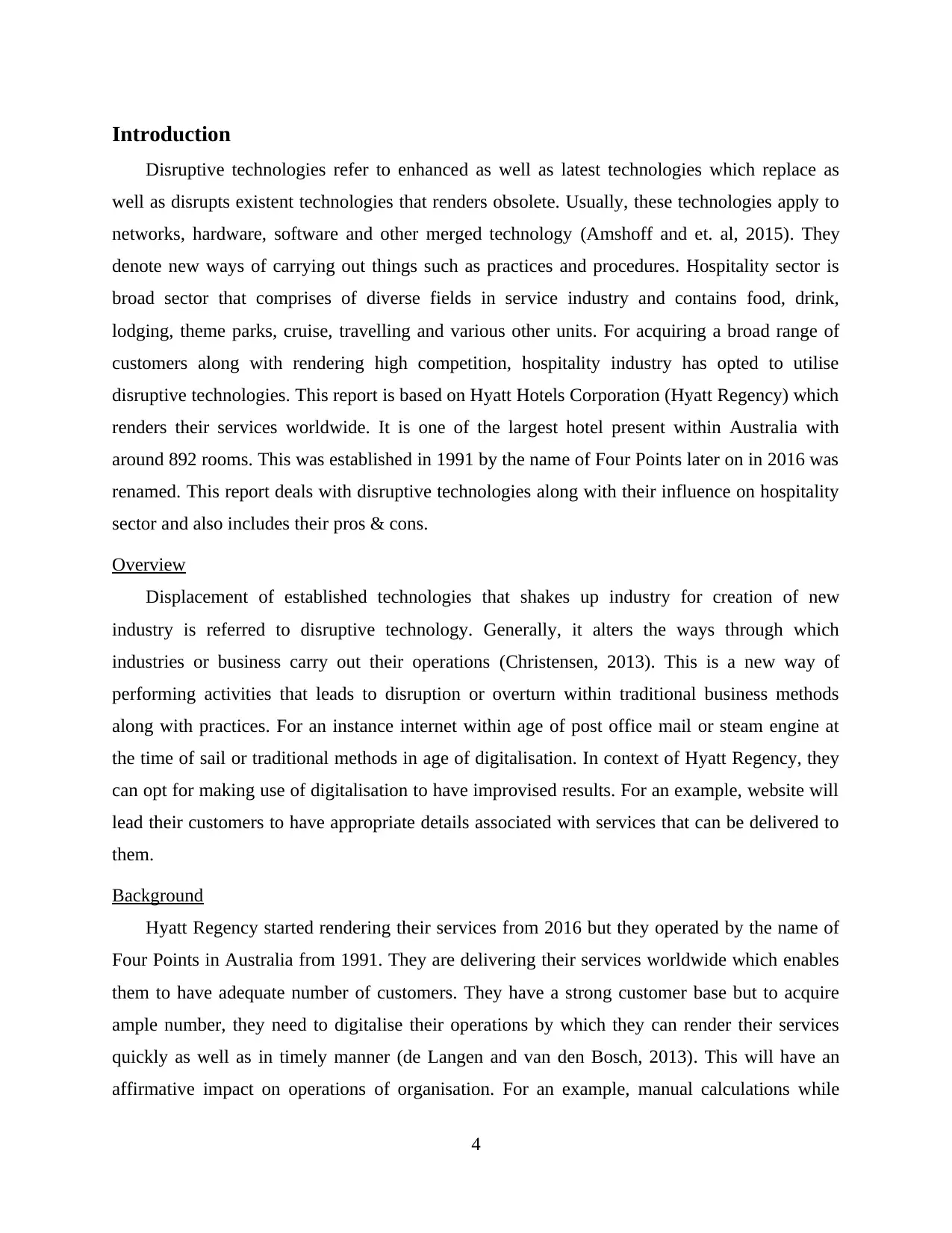
Introduction
Disruptive technologies refer to enhanced as well as latest technologies which replace as
well as disrupts existent technologies that renders obsolete. Usually, these technologies apply to
networks, hardware, software and other merged technology (Amshoff and et. al, 2015). They
denote new ways of carrying out things such as practices and procedures. Hospitality sector is
broad sector that comprises of diverse fields in service industry and contains food, drink,
lodging, theme parks, cruise, travelling and various other units. For acquiring a broad range of
customers along with rendering high competition, hospitality industry has opted to utilise
disruptive technologies. This report is based on Hyatt Hotels Corporation (Hyatt Regency) which
renders their services worldwide. It is one of the largest hotel present within Australia with
around 892 rooms. This was established in 1991 by the name of Four Points later on in 2016 was
renamed. This report deals with disruptive technologies along with their influence on hospitality
sector and also includes their pros & cons.
Overview
Displacement of established technologies that shakes up industry for creation of new
industry is referred to disruptive technology. Generally, it alters the ways through which
industries or business carry out their operations (Christensen, 2013). This is a new way of
performing activities that leads to disruption or overturn within traditional business methods
along with practices. For an instance internet within age of post office mail or steam engine at
the time of sail or traditional methods in age of digitalisation. In context of Hyatt Regency, they
can opt for making use of digitalisation to have improvised results. For an example, website will
lead their customers to have appropriate details associated with services that can be delivered to
them.
Background
Hyatt Regency started rendering their services from 2016 but they operated by the name of
Four Points in Australia from 1991. They are delivering their services worldwide which enables
them to have adequate number of customers. They have a strong customer base but to acquire
ample number, they need to digitalise their operations by which they can render their services
quickly as well as in timely manner (de Langen and van den Bosch, 2013). This will have an
affirmative impact on operations of organisation. For an example, manual calculations while
4
Disruptive technologies refer to enhanced as well as latest technologies which replace as
well as disrupts existent technologies that renders obsolete. Usually, these technologies apply to
networks, hardware, software and other merged technology (Amshoff and et. al, 2015). They
denote new ways of carrying out things such as practices and procedures. Hospitality sector is
broad sector that comprises of diverse fields in service industry and contains food, drink,
lodging, theme parks, cruise, travelling and various other units. For acquiring a broad range of
customers along with rendering high competition, hospitality industry has opted to utilise
disruptive technologies. This report is based on Hyatt Hotels Corporation (Hyatt Regency) which
renders their services worldwide. It is one of the largest hotel present within Australia with
around 892 rooms. This was established in 1991 by the name of Four Points later on in 2016 was
renamed. This report deals with disruptive technologies along with their influence on hospitality
sector and also includes their pros & cons.
Overview
Displacement of established technologies that shakes up industry for creation of new
industry is referred to disruptive technology. Generally, it alters the ways through which
industries or business carry out their operations (Christensen, 2013). This is a new way of
performing activities that leads to disruption or overturn within traditional business methods
along with practices. For an instance internet within age of post office mail or steam engine at
the time of sail or traditional methods in age of digitalisation. In context of Hyatt Regency, they
can opt for making use of digitalisation to have improvised results. For an example, website will
lead their customers to have appropriate details associated with services that can be delivered to
them.
Background
Hyatt Regency started rendering their services from 2016 but they operated by the name of
Four Points in Australia from 1991. They are delivering their services worldwide which enables
them to have adequate number of customers. They have a strong customer base but to acquire
ample number, they need to digitalise their operations by which they can render their services
quickly as well as in timely manner (de Langen and van den Bosch, 2013). This will have an
affirmative impact on operations of organisation. For an example, manual calculations while
4
Paraphrase This Document
Need a fresh take? Get an instant paraphrase of this document with our AI Paraphraser
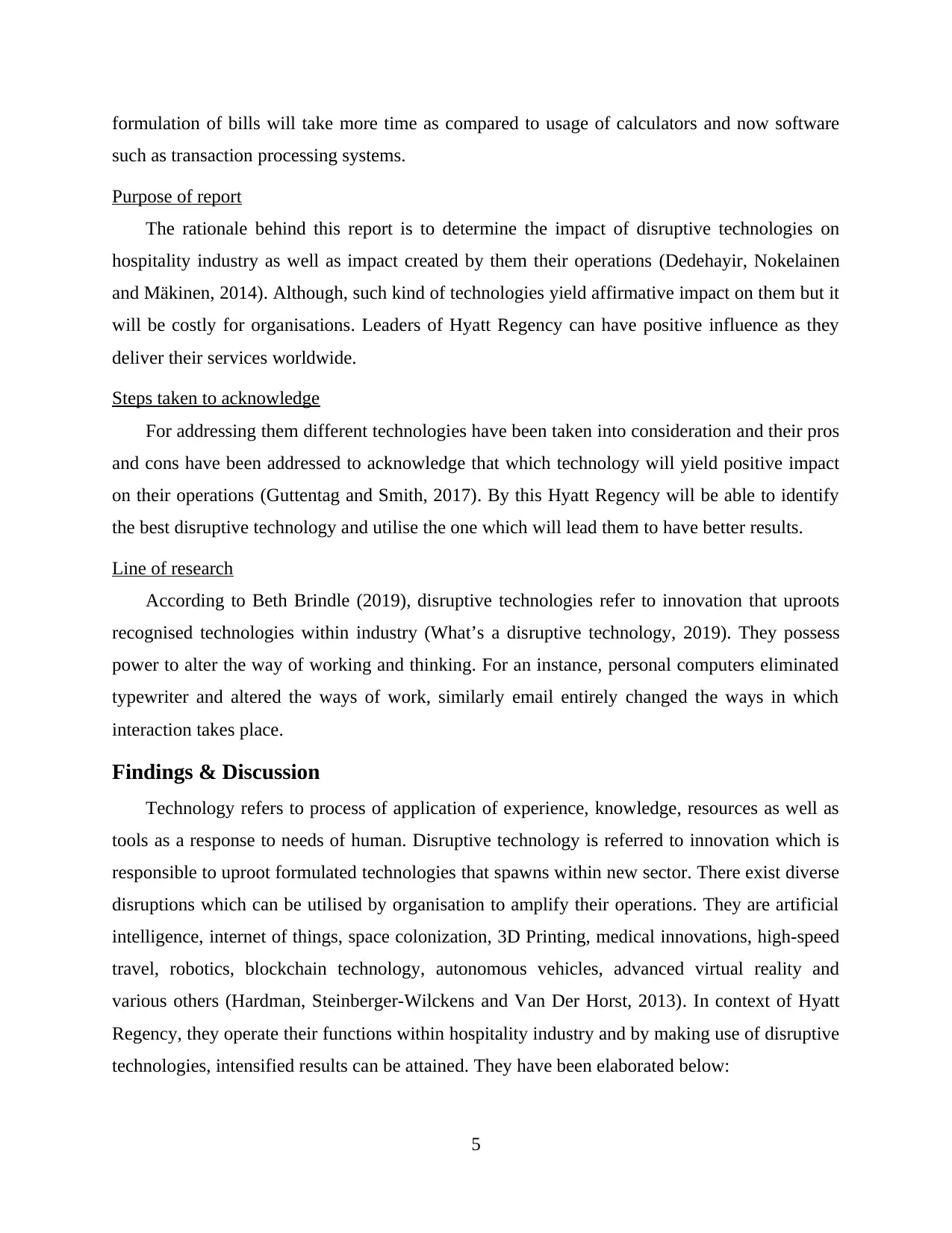
formulation of bills will take more time as compared to usage of calculators and now software
such as transaction processing systems.
Purpose of report
The rationale behind this report is to determine the impact of disruptive technologies on
hospitality industry as well as impact created by them their operations (Dedehayir, Nokelainen
and Mäkinen, 2014). Although, such kind of technologies yield affirmative impact on them but it
will be costly for organisations. Leaders of Hyatt Regency can have positive influence as they
deliver their services worldwide.
Steps taken to acknowledge
For addressing them different technologies have been taken into consideration and their pros
and cons have been addressed to acknowledge that which technology will yield positive impact
on their operations (Guttentag and Smith, 2017). By this Hyatt Regency will be able to identify
the best disruptive technology and utilise the one which will lead them to have better results.
Line of research
According to Beth Brindle (2019), disruptive technologies refer to innovation that uproots
recognised technologies within industry (What’s a disruptive technology, 2019). They possess
power to alter the way of working and thinking. For an instance, personal computers eliminated
typewriter and altered the ways of work, similarly email entirely changed the ways in which
interaction takes place.
Findings & Discussion
Technology refers to process of application of experience, knowledge, resources as well as
tools as a response to needs of human. Disruptive technology is referred to innovation which is
responsible to uproot formulated technologies that spawns within new sector. There exist diverse
disruptions which can be utilised by organisation to amplify their operations. They are artificial
intelligence, internet of things, space colonization, 3D Printing, medical innovations, high-speed
travel, robotics, blockchain technology, autonomous vehicles, advanced virtual reality and
various others (Hardman, Steinberger-Wilckens and Van Der Horst, 2013). In context of Hyatt
Regency, they operate their functions within hospitality industry and by making use of disruptive
technologies, intensified results can be attained. They have been elaborated below:
5
such as transaction processing systems.
Purpose of report
The rationale behind this report is to determine the impact of disruptive technologies on
hospitality industry as well as impact created by them their operations (Dedehayir, Nokelainen
and Mäkinen, 2014). Although, such kind of technologies yield affirmative impact on them but it
will be costly for organisations. Leaders of Hyatt Regency can have positive influence as they
deliver their services worldwide.
Steps taken to acknowledge
For addressing them different technologies have been taken into consideration and their pros
and cons have been addressed to acknowledge that which technology will yield positive impact
on their operations (Guttentag and Smith, 2017). By this Hyatt Regency will be able to identify
the best disruptive technology and utilise the one which will lead them to have better results.
Line of research
According to Beth Brindle (2019), disruptive technologies refer to innovation that uproots
recognised technologies within industry (What’s a disruptive technology, 2019). They possess
power to alter the way of working and thinking. For an instance, personal computers eliminated
typewriter and altered the ways of work, similarly email entirely changed the ways in which
interaction takes place.
Findings & Discussion
Technology refers to process of application of experience, knowledge, resources as well as
tools as a response to needs of human. Disruptive technology is referred to innovation which is
responsible to uproot formulated technologies that spawns within new sector. There exist diverse
disruptions which can be utilised by organisation to amplify their operations. They are artificial
intelligence, internet of things, space colonization, 3D Printing, medical innovations, high-speed
travel, robotics, blockchain technology, autonomous vehicles, advanced virtual reality and
various others (Hardman, Steinberger-Wilckens and Van Der Horst, 2013). In context of Hyatt
Regency, they operate their functions within hospitality industry and by making use of disruptive
technologies, intensified results can be attained. They have been elaborated below:
5
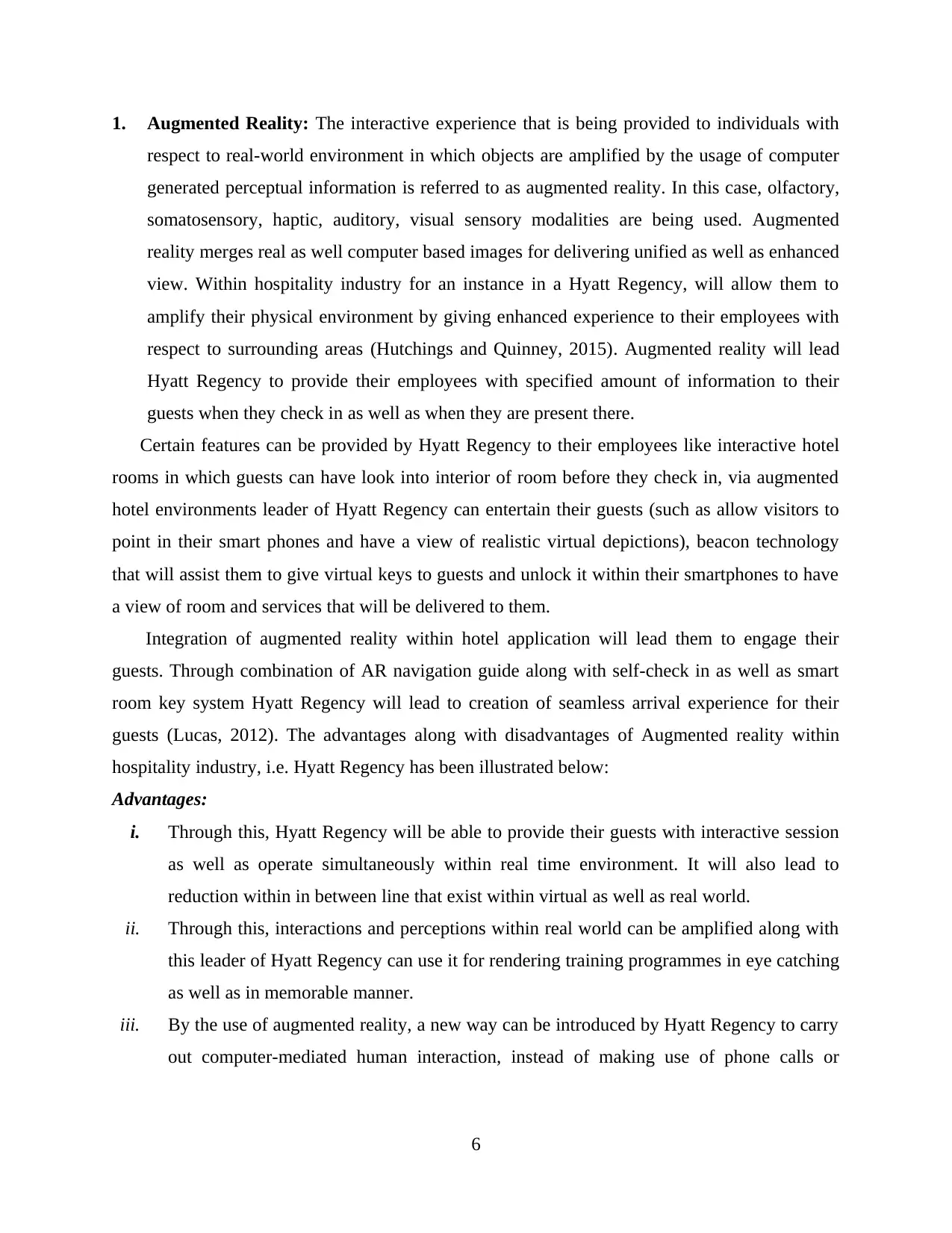
1. Augmented Reality: The interactive experience that is being provided to individuals with
respect to real-world environment in which objects are amplified by the usage of computer
generated perceptual information is referred to as augmented reality. In this case, olfactory,
somatosensory, haptic, auditory, visual sensory modalities are being used. Augmented
reality merges real as well computer based images for delivering unified as well as enhanced
view. Within hospitality industry for an instance in a Hyatt Regency, will allow them to
amplify their physical environment by giving enhanced experience to their employees with
respect to surrounding areas (Hutchings and Quinney, 2015). Augmented reality will lead
Hyatt Regency to provide their employees with specified amount of information to their
guests when they check in as well as when they are present there.
Certain features can be provided by Hyatt Regency to their employees like interactive hotel
rooms in which guests can have look into interior of room before they check in, via augmented
hotel environments leader of Hyatt Regency can entertain their guests (such as allow visitors to
point in their smart phones and have a view of realistic virtual depictions), beacon technology
that will assist them to give virtual keys to guests and unlock it within their smartphones to have
a view of room and services that will be delivered to them.
Integration of augmented reality within hotel application will lead them to engage their
guests. Through combination of AR navigation guide along with self-check in as well as smart
room key system Hyatt Regency will lead to creation of seamless arrival experience for their
guests (Lucas, 2012). The advantages along with disadvantages of Augmented reality within
hospitality industry, i.e. Hyatt Regency has been illustrated below:
Advantages:
i. Through this, Hyatt Regency will be able to provide their guests with interactive session
as well as operate simultaneously within real time environment. It will also lead to
reduction within in between line that exist within virtual as well as real world.
ii. Through this, interactions and perceptions within real world can be amplified along with
this leader of Hyatt Regency can use it for rendering training programmes in eye catching
as well as in memorable manner.
iii. By the use of augmented reality, a new way can be introduced by Hyatt Regency to carry
out computer-mediated human interaction, instead of making use of phone calls or
6
respect to real-world environment in which objects are amplified by the usage of computer
generated perceptual information is referred to as augmented reality. In this case, olfactory,
somatosensory, haptic, auditory, visual sensory modalities are being used. Augmented
reality merges real as well computer based images for delivering unified as well as enhanced
view. Within hospitality industry for an instance in a Hyatt Regency, will allow them to
amplify their physical environment by giving enhanced experience to their employees with
respect to surrounding areas (Hutchings and Quinney, 2015). Augmented reality will lead
Hyatt Regency to provide their employees with specified amount of information to their
guests when they check in as well as when they are present there.
Certain features can be provided by Hyatt Regency to their employees like interactive hotel
rooms in which guests can have look into interior of room before they check in, via augmented
hotel environments leader of Hyatt Regency can entertain their guests (such as allow visitors to
point in their smart phones and have a view of realistic virtual depictions), beacon technology
that will assist them to give virtual keys to guests and unlock it within their smartphones to have
a view of room and services that will be delivered to them.
Integration of augmented reality within hotel application will lead them to engage their
guests. Through combination of AR navigation guide along with self-check in as well as smart
room key system Hyatt Regency will lead to creation of seamless arrival experience for their
guests (Lucas, 2012). The advantages along with disadvantages of Augmented reality within
hospitality industry, i.e. Hyatt Regency has been illustrated below:
Advantages:
i. Through this, Hyatt Regency will be able to provide their guests with interactive session
as well as operate simultaneously within real time environment. It will also lead to
reduction within in between line that exist within virtual as well as real world.
ii. Through this, interactions and perceptions within real world can be amplified along with
this leader of Hyatt Regency can use it for rendering training programmes in eye catching
as well as in memorable manner.
iii. By the use of augmented reality, a new way can be introduced by Hyatt Regency to carry
out computer-mediated human interaction, instead of making use of phone calls or
6
⊘ This is a preview!⊘
Do you want full access?
Subscribe today to unlock all pages.

Trusted by 1+ million students worldwide
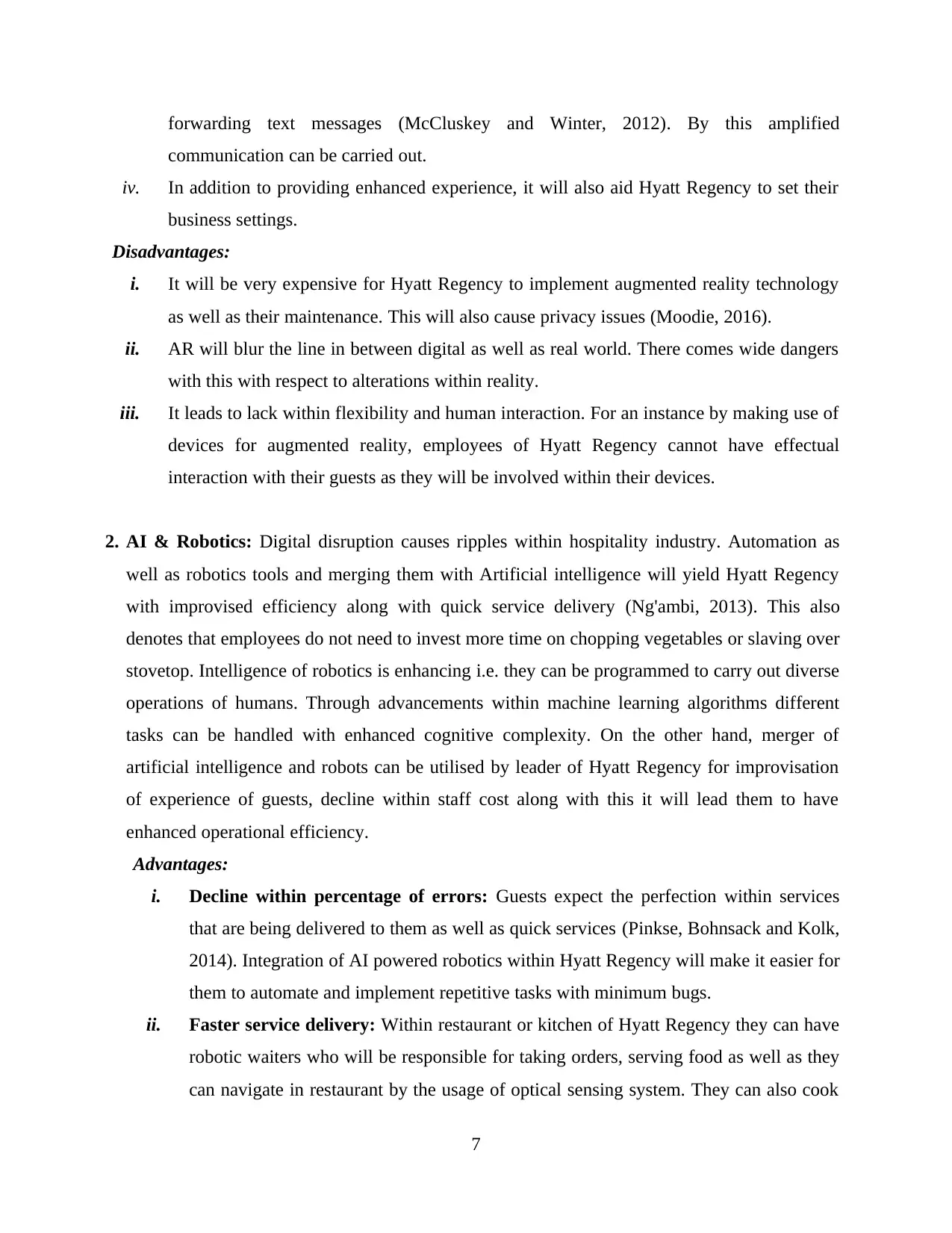
forwarding text messages (McCluskey and Winter, 2012). By this amplified
communication can be carried out.
iv. In addition to providing enhanced experience, it will also aid Hyatt Regency to set their
business settings.
Disadvantages:
i. It will be very expensive for Hyatt Regency to implement augmented reality technology
as well as their maintenance. This will also cause privacy issues (Moodie, 2016).
ii. AR will blur the line in between digital as well as real world. There comes wide dangers
with this with respect to alterations within reality.
iii. It leads to lack within flexibility and human interaction. For an instance by making use of
devices for augmented reality, employees of Hyatt Regency cannot have effectual
interaction with their guests as they will be involved within their devices.
2. AI & Robotics: Digital disruption causes ripples within hospitality industry. Automation as
well as robotics tools and merging them with Artificial intelligence will yield Hyatt Regency
with improvised efficiency along with quick service delivery (Ng'ambi, 2013). This also
denotes that employees do not need to invest more time on chopping vegetables or slaving over
stovetop. Intelligence of robotics is enhancing i.e. they can be programmed to carry out diverse
operations of humans. Through advancements within machine learning algorithms different
tasks can be handled with enhanced cognitive complexity. On the other hand, merger of
artificial intelligence and robots can be utilised by leader of Hyatt Regency for improvisation
of experience of guests, decline within staff cost along with this it will lead them to have
enhanced operational efficiency.
Advantages:
i. Decline within percentage of errors: Guests expect the perfection within services
that are being delivered to them as well as quick services (Pinkse, Bohnsack and Kolk,
2014). Integration of AI powered robotics within Hyatt Regency will make it easier for
them to automate and implement repetitive tasks with minimum bugs.
ii. Faster service delivery: Within restaurant or kitchen of Hyatt Regency they can have
robotic waiters who will be responsible for taking orders, serving food as well as they
can navigate in restaurant by the usage of optical sensing system. They can also cook
7
communication can be carried out.
iv. In addition to providing enhanced experience, it will also aid Hyatt Regency to set their
business settings.
Disadvantages:
i. It will be very expensive for Hyatt Regency to implement augmented reality technology
as well as their maintenance. This will also cause privacy issues (Moodie, 2016).
ii. AR will blur the line in between digital as well as real world. There comes wide dangers
with this with respect to alterations within reality.
iii. It leads to lack within flexibility and human interaction. For an instance by making use of
devices for augmented reality, employees of Hyatt Regency cannot have effectual
interaction with their guests as they will be involved within their devices.
2. AI & Robotics: Digital disruption causes ripples within hospitality industry. Automation as
well as robotics tools and merging them with Artificial intelligence will yield Hyatt Regency
with improvised efficiency along with quick service delivery (Ng'ambi, 2013). This also
denotes that employees do not need to invest more time on chopping vegetables or slaving over
stovetop. Intelligence of robotics is enhancing i.e. they can be programmed to carry out diverse
operations of humans. Through advancements within machine learning algorithms different
tasks can be handled with enhanced cognitive complexity. On the other hand, merger of
artificial intelligence and robots can be utilised by leader of Hyatt Regency for improvisation
of experience of guests, decline within staff cost along with this it will lead them to have
enhanced operational efficiency.
Advantages:
i. Decline within percentage of errors: Guests expect the perfection within services
that are being delivered to them as well as quick services (Pinkse, Bohnsack and Kolk,
2014). Integration of AI powered robotics within Hyatt Regency will make it easier for
them to automate and implement repetitive tasks with minimum bugs.
ii. Faster service delivery: Within restaurant or kitchen of Hyatt Regency they can have
robotic waiters who will be responsible for taking orders, serving food as well as they
can navigate in restaurant by the usage of optical sensing system. They can also cook
7
Paraphrase This Document
Need a fresh take? Get an instant paraphrase of this document with our AI Paraphraser
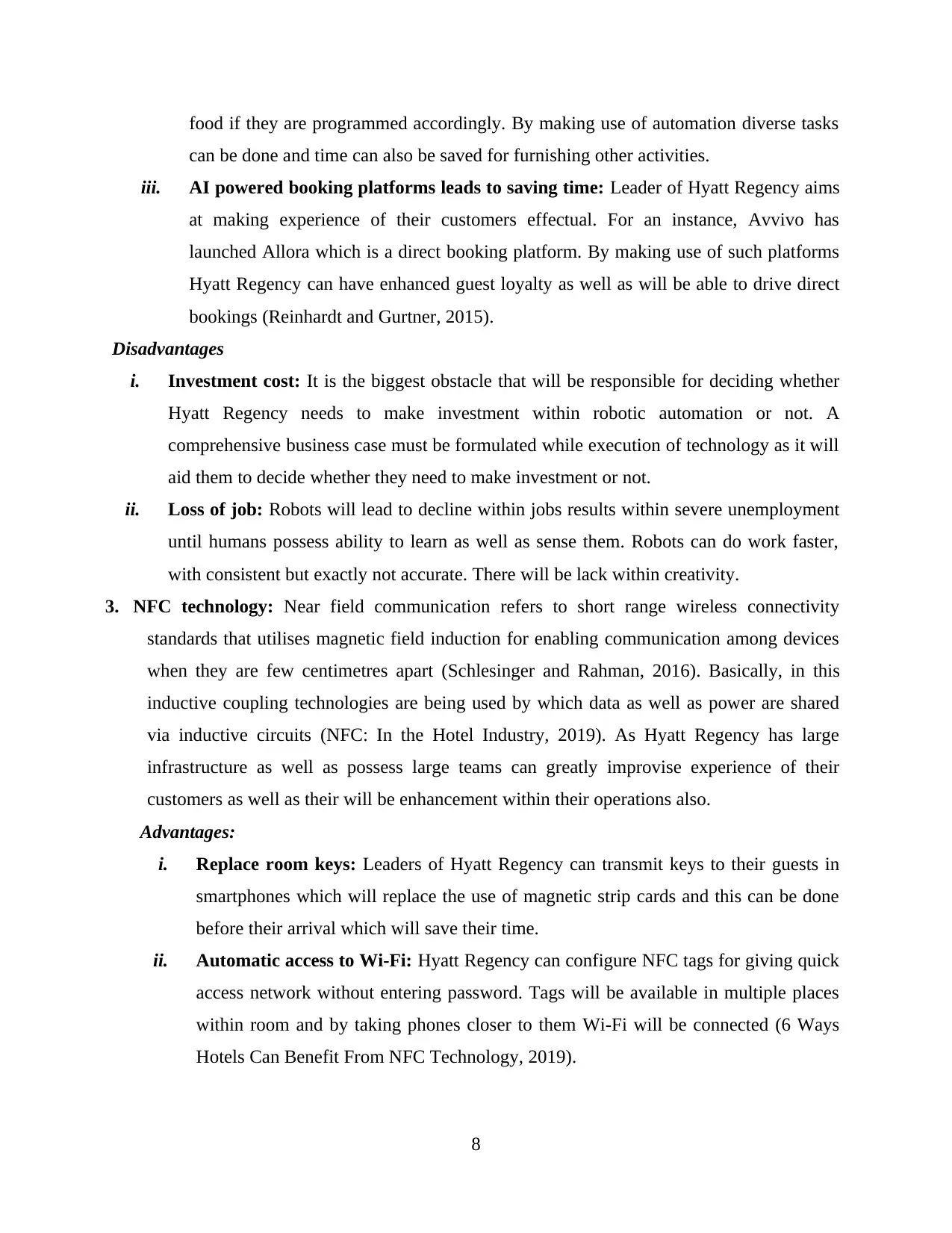
food if they are programmed accordingly. By making use of automation diverse tasks
can be done and time can also be saved for furnishing other activities.
iii. AI powered booking platforms leads to saving time: Leader of Hyatt Regency aims
at making experience of their customers effectual. For an instance, Avvivo has
launched Allora which is a direct booking platform. By making use of such platforms
Hyatt Regency can have enhanced guest loyalty as well as will be able to drive direct
bookings (Reinhardt and Gurtner, 2015).
Disadvantages
i. Investment cost: It is the biggest obstacle that will be responsible for deciding whether
Hyatt Regency needs to make investment within robotic automation or not. A
comprehensive business case must be formulated while execution of technology as it will
aid them to decide whether they need to make investment or not.
ii. Loss of job: Robots will lead to decline within jobs results within severe unemployment
until humans possess ability to learn as well as sense them. Robots can do work faster,
with consistent but exactly not accurate. There will be lack within creativity.
3. NFC technology: Near field communication refers to short range wireless connectivity
standards that utilises magnetic field induction for enabling communication among devices
when they are few centimetres apart (Schlesinger and Rahman, 2016). Basically, in this
inductive coupling technologies are being used by which data as well as power are shared
via inductive circuits (NFC: In the Hotel Industry, 2019). As Hyatt Regency has large
infrastructure as well as possess large teams can greatly improvise experience of their
customers as well as their will be enhancement within their operations also.
Advantages:
i. Replace room keys: Leaders of Hyatt Regency can transmit keys to their guests in
smartphones which will replace the use of magnetic strip cards and this can be done
before their arrival which will save their time.
ii. Automatic access to Wi-Fi: Hyatt Regency can configure NFC tags for giving quick
access network without entering password. Tags will be available in multiple places
within room and by taking phones closer to them Wi-Fi will be connected (6 Ways
Hotels Can Benefit From NFC Technology, 2019).
8
can be done and time can also be saved for furnishing other activities.
iii. AI powered booking platforms leads to saving time: Leader of Hyatt Regency aims
at making experience of their customers effectual. For an instance, Avvivo has
launched Allora which is a direct booking platform. By making use of such platforms
Hyatt Regency can have enhanced guest loyalty as well as will be able to drive direct
bookings (Reinhardt and Gurtner, 2015).
Disadvantages
i. Investment cost: It is the biggest obstacle that will be responsible for deciding whether
Hyatt Regency needs to make investment within robotic automation or not. A
comprehensive business case must be formulated while execution of technology as it will
aid them to decide whether they need to make investment or not.
ii. Loss of job: Robots will lead to decline within jobs results within severe unemployment
until humans possess ability to learn as well as sense them. Robots can do work faster,
with consistent but exactly not accurate. There will be lack within creativity.
3. NFC technology: Near field communication refers to short range wireless connectivity
standards that utilises magnetic field induction for enabling communication among devices
when they are few centimetres apart (Schlesinger and Rahman, 2016). Basically, in this
inductive coupling technologies are being used by which data as well as power are shared
via inductive circuits (NFC: In the Hotel Industry, 2019). As Hyatt Regency has large
infrastructure as well as possess large teams can greatly improvise experience of their
customers as well as their will be enhancement within their operations also.
Advantages:
i. Replace room keys: Leaders of Hyatt Regency can transmit keys to their guests in
smartphones which will replace the use of magnetic strip cards and this can be done
before their arrival which will save their time.
ii. Automatic access to Wi-Fi: Hyatt Regency can configure NFC tags for giving quick
access network without entering password. Tags will be available in multiple places
within room and by taking phones closer to them Wi-Fi will be connected (6 Ways
Hotels Can Benefit From NFC Technology, 2019).
8
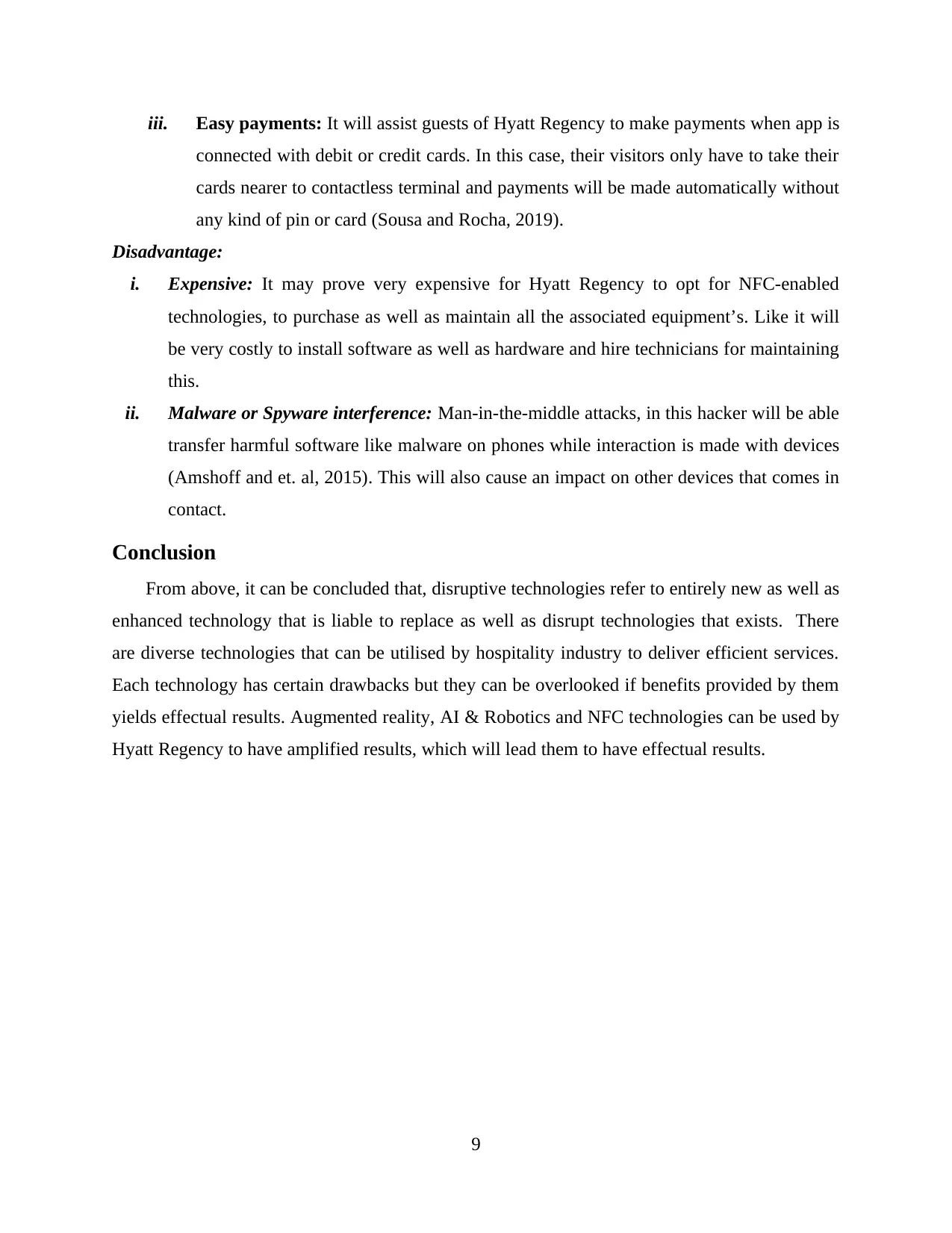
iii. Easy payments: It will assist guests of Hyatt Regency to make payments when app is
connected with debit or credit cards. In this case, their visitors only have to take their
cards nearer to contactless terminal and payments will be made automatically without
any kind of pin or card (Sousa and Rocha, 2019).
Disadvantage:
i. Expensive: It may prove very expensive for Hyatt Regency to opt for NFC-enabled
technologies, to purchase as well as maintain all the associated equipment’s. Like it will
be very costly to install software as well as hardware and hire technicians for maintaining
this.
ii. Malware or Spyware interference: Man-in-the-middle attacks, in this hacker will be able
transfer harmful software like malware on phones while interaction is made with devices
(Amshoff and et. al, 2015). This will also cause an impact on other devices that comes in
contact.
Conclusion
From above, it can be concluded that, disruptive technologies refer to entirely new as well as
enhanced technology that is liable to replace as well as disrupt technologies that exists. There
are diverse technologies that can be utilised by hospitality industry to deliver efficient services.
Each technology has certain drawbacks but they can be overlooked if benefits provided by them
yields effectual results. Augmented reality, AI & Robotics and NFC technologies can be used by
Hyatt Regency to have amplified results, which will lead them to have effectual results.
9
connected with debit or credit cards. In this case, their visitors only have to take their
cards nearer to contactless terminal and payments will be made automatically without
any kind of pin or card (Sousa and Rocha, 2019).
Disadvantage:
i. Expensive: It may prove very expensive for Hyatt Regency to opt for NFC-enabled
technologies, to purchase as well as maintain all the associated equipment’s. Like it will
be very costly to install software as well as hardware and hire technicians for maintaining
this.
ii. Malware or Spyware interference: Man-in-the-middle attacks, in this hacker will be able
transfer harmful software like malware on phones while interaction is made with devices
(Amshoff and et. al, 2015). This will also cause an impact on other devices that comes in
contact.
Conclusion
From above, it can be concluded that, disruptive technologies refer to entirely new as well as
enhanced technology that is liable to replace as well as disrupt technologies that exists. There
are diverse technologies that can be utilised by hospitality industry to deliver efficient services.
Each technology has certain drawbacks but they can be overlooked if benefits provided by them
yields effectual results. Augmented reality, AI & Robotics and NFC technologies can be used by
Hyatt Regency to have amplified results, which will lead them to have effectual results.
9
⊘ This is a preview!⊘
Do you want full access?
Subscribe today to unlock all pages.

Trusted by 1+ million students worldwide
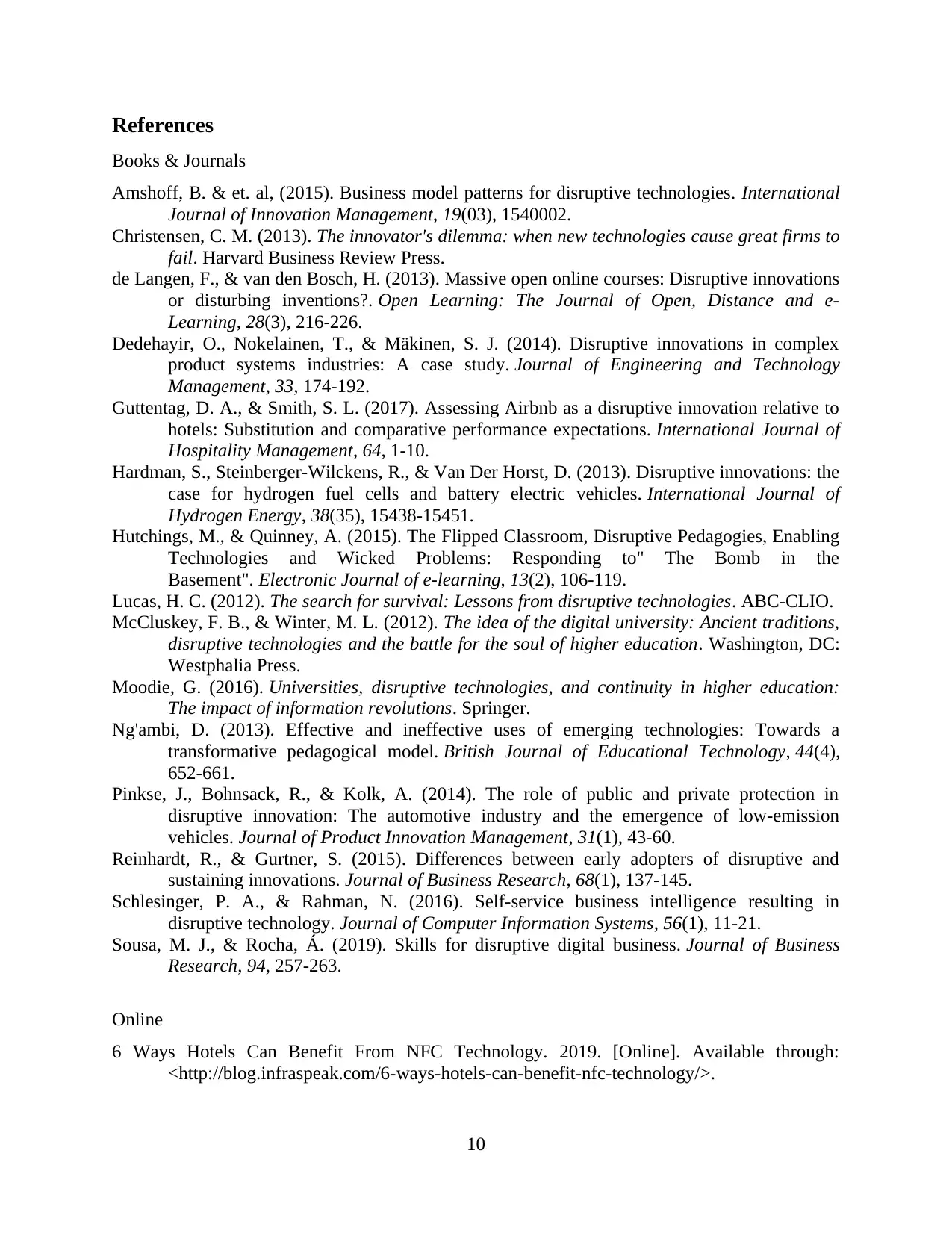
References
Books & Journals
Amshoff, B. & et. al, (2015). Business model patterns for disruptive technologies. International
Journal of Innovation Management, 19(03), 1540002.
Christensen, C. M. (2013). The innovator's dilemma: when new technologies cause great firms to
fail. Harvard Business Review Press.
de Langen, F., & van den Bosch, H. (2013). Massive open online courses: Disruptive innovations
or disturbing inventions?. Open Learning: The Journal of Open, Distance and e-
Learning, 28(3), 216-226.
Dedehayir, O., Nokelainen, T., & Mäkinen, S. J. (2014). Disruptive innovations in complex
product systems industries: A case study. Journal of Engineering and Technology
Management, 33, 174-192.
Guttentag, D. A., & Smith, S. L. (2017). Assessing Airbnb as a disruptive innovation relative to
hotels: Substitution and comparative performance expectations. International Journal of
Hospitality Management, 64, 1-10.
Hardman, S., Steinberger-Wilckens, R., & Van Der Horst, D. (2013). Disruptive innovations: the
case for hydrogen fuel cells and battery electric vehicles. International Journal of
Hydrogen Energy, 38(35), 15438-15451.
Hutchings, M., & Quinney, A. (2015). The Flipped Classroom, Disruptive Pedagogies, Enabling
Technologies and Wicked Problems: Responding to" The Bomb in the
Basement". Electronic Journal of e-learning, 13(2), 106-119.
Lucas, H. C. (2012). The search for survival: Lessons from disruptive technologies. ABC-CLIO.
McCluskey, F. B., & Winter, M. L. (2012). The idea of the digital university: Ancient traditions,
disruptive technologies and the battle for the soul of higher education. Washington, DC:
Westphalia Press.
Moodie, G. (2016). Universities, disruptive technologies, and continuity in higher education:
The impact of information revolutions. Springer.
Ng'ambi, D. (2013). Effective and ineffective uses of emerging technologies: Towards a
transformative pedagogical model. British Journal of Educational Technology, 44(4),
652-661.
Pinkse, J., Bohnsack, R., & Kolk, A. (2014). The role of public and private protection in
disruptive innovation: The automotive industry and the emergence of low‐emission
vehicles. Journal of Product Innovation Management, 31(1), 43-60.
Reinhardt, R., & Gurtner, S. (2015). Differences between early adopters of disruptive and
sustaining innovations. Journal of Business Research, 68(1), 137-145.
Schlesinger, P. A., & Rahman, N. (2016). Self-service business intelligence resulting in
disruptive technology. Journal of Computer Information Systems, 56(1), 11-21.
Sousa, M. J., & Rocha, Á. (2019). Skills for disruptive digital business. Journal of Business
Research, 94, 257-263.
Online
6 Ways Hotels Can Benefit From NFC Technology. 2019. [Online]. Available through:
<http://blog.infraspeak.com/6-ways-hotels-can-benefit-nfc-technology/>.
10
Books & Journals
Amshoff, B. & et. al, (2015). Business model patterns for disruptive technologies. International
Journal of Innovation Management, 19(03), 1540002.
Christensen, C. M. (2013). The innovator's dilemma: when new technologies cause great firms to
fail. Harvard Business Review Press.
de Langen, F., & van den Bosch, H. (2013). Massive open online courses: Disruptive innovations
or disturbing inventions?. Open Learning: The Journal of Open, Distance and e-
Learning, 28(3), 216-226.
Dedehayir, O., Nokelainen, T., & Mäkinen, S. J. (2014). Disruptive innovations in complex
product systems industries: A case study. Journal of Engineering and Technology
Management, 33, 174-192.
Guttentag, D. A., & Smith, S. L. (2017). Assessing Airbnb as a disruptive innovation relative to
hotels: Substitution and comparative performance expectations. International Journal of
Hospitality Management, 64, 1-10.
Hardman, S., Steinberger-Wilckens, R., & Van Der Horst, D. (2013). Disruptive innovations: the
case for hydrogen fuel cells and battery electric vehicles. International Journal of
Hydrogen Energy, 38(35), 15438-15451.
Hutchings, M., & Quinney, A. (2015). The Flipped Classroom, Disruptive Pedagogies, Enabling
Technologies and Wicked Problems: Responding to" The Bomb in the
Basement". Electronic Journal of e-learning, 13(2), 106-119.
Lucas, H. C. (2012). The search for survival: Lessons from disruptive technologies. ABC-CLIO.
McCluskey, F. B., & Winter, M. L. (2012). The idea of the digital university: Ancient traditions,
disruptive technologies and the battle for the soul of higher education. Washington, DC:
Westphalia Press.
Moodie, G. (2016). Universities, disruptive technologies, and continuity in higher education:
The impact of information revolutions. Springer.
Ng'ambi, D. (2013). Effective and ineffective uses of emerging technologies: Towards a
transformative pedagogical model. British Journal of Educational Technology, 44(4),
652-661.
Pinkse, J., Bohnsack, R., & Kolk, A. (2014). The role of public and private protection in
disruptive innovation: The automotive industry and the emergence of low‐emission
vehicles. Journal of Product Innovation Management, 31(1), 43-60.
Reinhardt, R., & Gurtner, S. (2015). Differences between early adopters of disruptive and
sustaining innovations. Journal of Business Research, 68(1), 137-145.
Schlesinger, P. A., & Rahman, N. (2016). Self-service business intelligence resulting in
disruptive technology. Journal of Computer Information Systems, 56(1), 11-21.
Sousa, M. J., & Rocha, Á. (2019). Skills for disruptive digital business. Journal of Business
Research, 94, 257-263.
Online
6 Ways Hotels Can Benefit From NFC Technology. 2019. [Online]. Available through:
<http://blog.infraspeak.com/6-ways-hotels-can-benefit-nfc-technology/>.
10
Paraphrase This Document
Need a fresh take? Get an instant paraphrase of this document with our AI Paraphraser
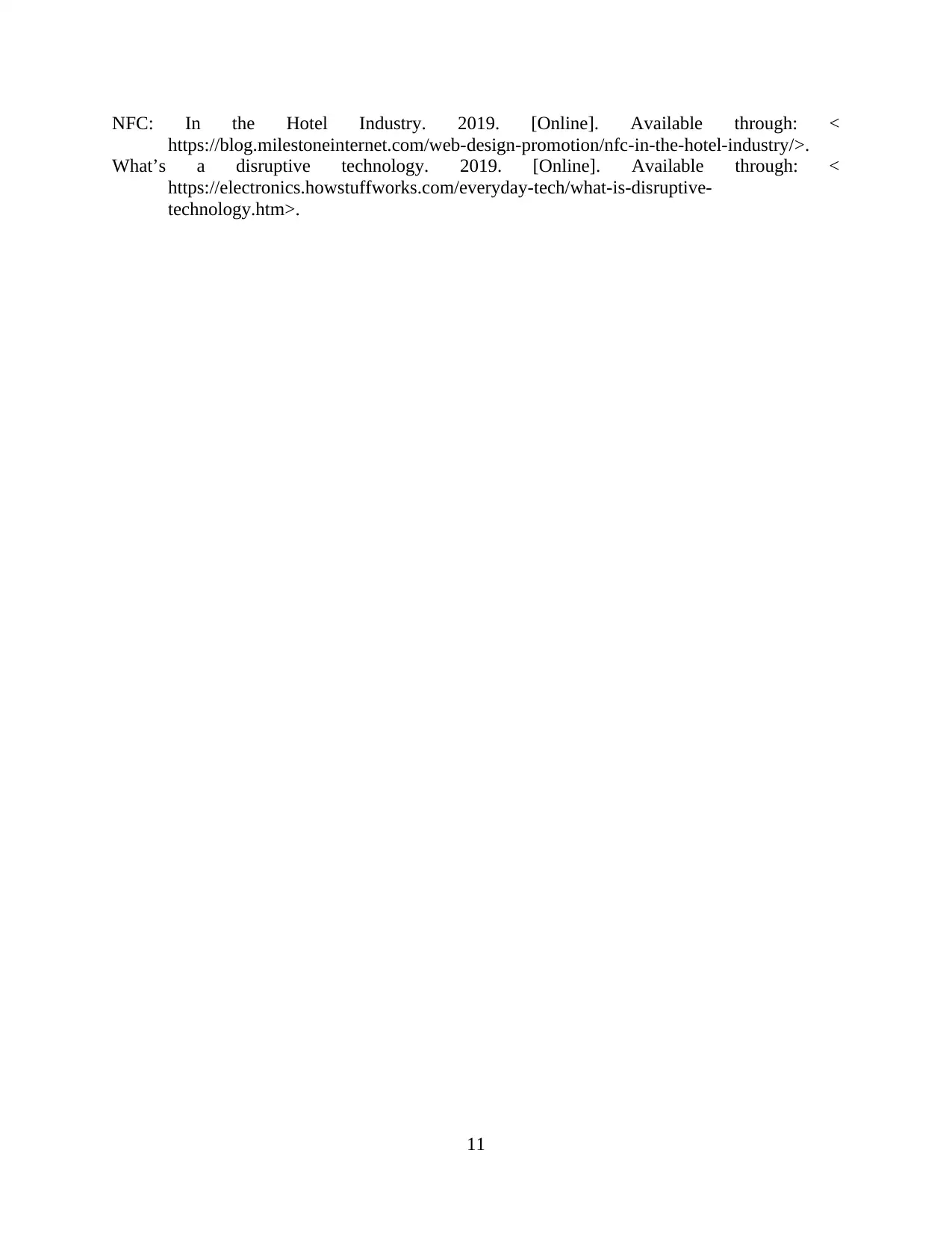
NFC: In the Hotel Industry. 2019. [Online]. Available through: <
https://blog.milestoneinternet.com/web-design-promotion/nfc-in-the-hotel-industry/>.
What’s a disruptive technology. 2019. [Online]. Available through: <
https://electronics.howstuffworks.com/everyday-tech/what-is-disruptive-
technology.htm>.
11
https://blog.milestoneinternet.com/web-design-promotion/nfc-in-the-hotel-industry/>.
What’s a disruptive technology. 2019. [Online]. Available through: <
https://electronics.howstuffworks.com/everyday-tech/what-is-disruptive-
technology.htm>.
11
1 out of 11
Related Documents
Your All-in-One AI-Powered Toolkit for Academic Success.
+13062052269
info@desklib.com
Available 24*7 on WhatsApp / Email
![[object Object]](/_next/static/media/star-bottom.7253800d.svg)
Unlock your academic potential
Copyright © 2020–2026 A2Z Services. All Rights Reserved. Developed and managed by ZUCOL.





